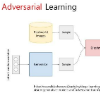Current approaches which are mainly based on the extraction of low-level relations among individual events are limited by the shortage of publicly available labelled data. Therefore, the resulting models perform poorly when applied to a distributionally different domain for which labelled data did not exist at the time of training. To overcome this limitation, in this paper, we leverage the characteristics of dependency trees and adversarial learning to address the tasks of adaptive causality identification and localisation. The term adaptive is used since the training and test data come from two distributionally different datasets, which to the best of our knowledge, this work is the first to address. Moreover, we present a new causality dataset, namely MedCaus, which integrates all types of causality in the text. Our experiments on four different benchmark causality datasets demonstrate the superiority of our approach over the existing baselines, by up to 7% improvement, on the tasks of identification and localisation of the causal relations from the text.
翻译:目前主要基于在个别事件之间提取低层次关系的方法因缺少公开的标签数据而受到限制,因此,所产生的模型在应用于培训时没有贴标签数据的分布式不同领域时效果不佳。为了克服这一局限性,我们在本文件中利用依赖树和对抗性学习的特点来处理适应性因果关系识别和本地化的任务。由于培训和测试数据来自两个分布式不同的数据集,因此使用适应性术语,据我们所知,这项工作是第一个要解决的。此外,我们提出了一个新的因果关系数据集,即MedCaus,将所有类型的因果关系纳入案文。我们关于四种不同基准因果关系数据集的实验表明,我们的方法优于现有基线,改进幅度高达7%,用于确定文本中的因果关系并确定地方。




